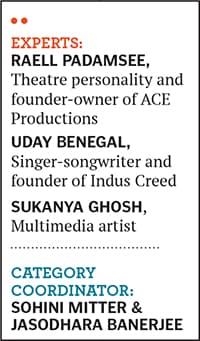Swarupa Ananth-Sawkar: Queen of her beats
Versatile percussionist Swarupa Ananth-Sawkar, 28, is a passionate live performer. And, so far, she has found the right rhythm


Swarupa Ananth-Sawkar | 28
Category: Art & culture
In the elitist world of Hindustani classical music, a fusion artiste is either patronised or disdained. But 28-year-old Swarupa Ananth-Sawkar has triumphed against all odds, ranking among the country’s most innovative young musicians today.
Part of the Mumbai-based two-part ‘ethnotronic’ outfit, Filter Coffee, which she co-founded in 2009, this versatile percussionist—she dabbles in the tabla, djembe, darbuka, cajon, dhol, duff and drums—has played at myriad venues from festivals to flea markets, from temples to nightclubs, across India and the UK, effortlessly marrying classical notes with folk tunes and electronic grooves. “Last year was particularly happening. We’ve gone all out with our music,” she says.
It wasn’t hunky-dory to begin with though. At the age of 12, Swarupa was turned down at tabla maestro Ustad Alla Rakha’s music institute “for being underage and for being a girl”. Surprising that, because ‘Abbaji’ (as he was known among his students) is particularly lauded for having discouraged gender-based discrimination at a time when women were often banned from playing instruments. Fortunately for Swarupa, Ustadji had an epiphany and decided to rope her in. “My mother, who had taken me to his institute, insisted that he hear me for a few minutes. If nothing, we would just seek his blessings and go back. But he loved what I played. And I started classes the next day,” she says.
She trained under him until his demise in 2000, and later under his sons Ustad Zakir Hussain and Fazal Qureshi. “Zakir Hussain has been my guru and mentor. I look up to him for not just what he plays but also for things like presentation, interaction on stage, and the way he deconstructs his music to a layman without diluting the classical part of it,” says Swarupa. “That’s what a live performance is. You’ve got to play for everybody and hold them in rapt attention.”
She must know a thing or two about live performances. Her bandmate and flautist Shriram Sampath, whom she’s known and played with for over a decade, says, “Swarupa is a powerhouse stage performer. I have learnt my stagecraft entirely from her. She’s played with so many greats [including Ustad Zakir Hussain].”
Popular music composer Ram Sampath who’s worked extensively with her (most recently in Coke Studio @ MTV) has been impressed too. He says, “Stage brings out the best in Swarupa. A lot of performers melt on stage but she only grows. It’s a treat to watch her.”
It helps that she tasted stage very early, having played the tabla at her mother’s (who performed Gujarati songs) shows while growing up. It was she who spotted the musician in Swarupa. “My mother would always see me run my fingers on anything possible, a door, a table or anything. She sent me for tabla classes when I was seven,” she says. Urged by a Carnatic musician-grandmother, Swarupa even took up classical vocals, albeit briefly “because my ear would always be in the next room where the tabla was playing”.
In the years that followed, she would be playing at sundry gigs, college fests, local competitions and more, self-learning along the way. “I’ve trained only in tabla. All the other instruments I play are self-taught,” she says.
As Filter Coffee, in its current form, started taking shape, Swarupa quit her day job at EMI Music two years ago to devote all her hours to it. “Earlier I would work 9-to-6 and then do gigs in the evening. But I realised that in order to get better returns, I needed to give music more time.”
And the band’s spectacular run since 2013 has validated her gut call. It toured UK for the first time, playing at London, Southampton, Cambridge, and Brighton among other places. In 2014, it performed at the world-renowned Glastonbury Music Festival which Swarupa remembers with much fondness. She says, “Glastonbury is in the middle of nowhere. People drive up all those miles and camp there only for the music. That is just wonderful.”
How do global audiences receive Indian fusion music?
“Very liberally,” she says. “Audiences in the West are amazing. We played at a pub (Jamboree) in London. And the entire English crowd was sitting on the floor, almost like a baithak, listening and reacting to Indian classical music.”In her own country, though, she’s often been at the receiving end of snarks. Audiences have been amazed at a woman playing the tabla, despite India having produced one of the finest tabla soloists in the world—Pandita Anuradha Pal, who incidentally trained under Ustad Alla Rakha too. “I’ve had people asking me if I was just miming on stage,” says Swarupa. But she confesses that being a woman in a patriarchal music world can be advantageous too. “I don’t like saying this, but you get more work because there is that exotic element about you.”
In January, Swarupa and Shriram turned music producers with Raagatronic, an album they call their “tribute to Indian classical music” and one that is earning rave reviews. Music production is challenging, she says. “It is very different from live and you’re sometimes making music out of thin air.”
But, happily, she is among those who thrive on turning challenges into opportunities.
Here is the full list of 30 Under 30 for 2015 and its methodology
First Published: Feb 09, 2015, 06:49
Subscribe Now